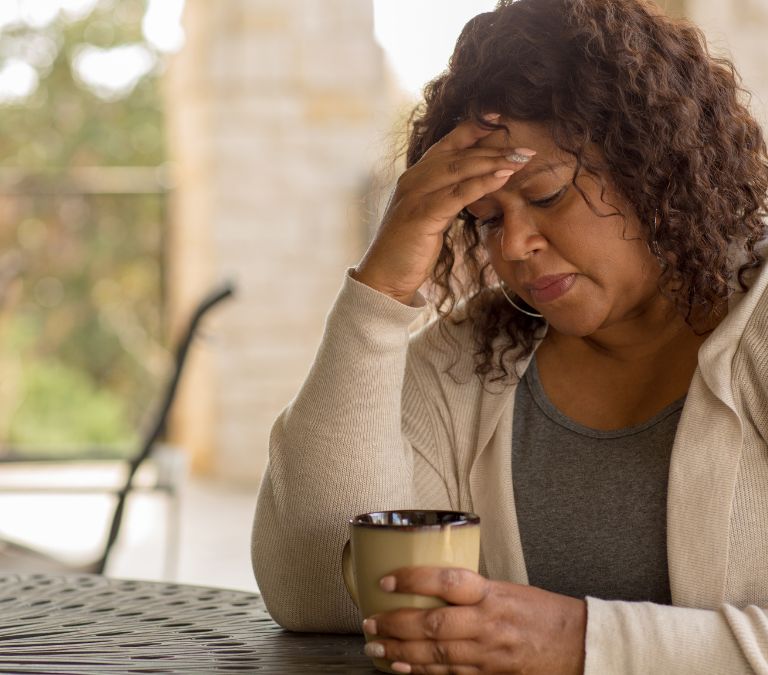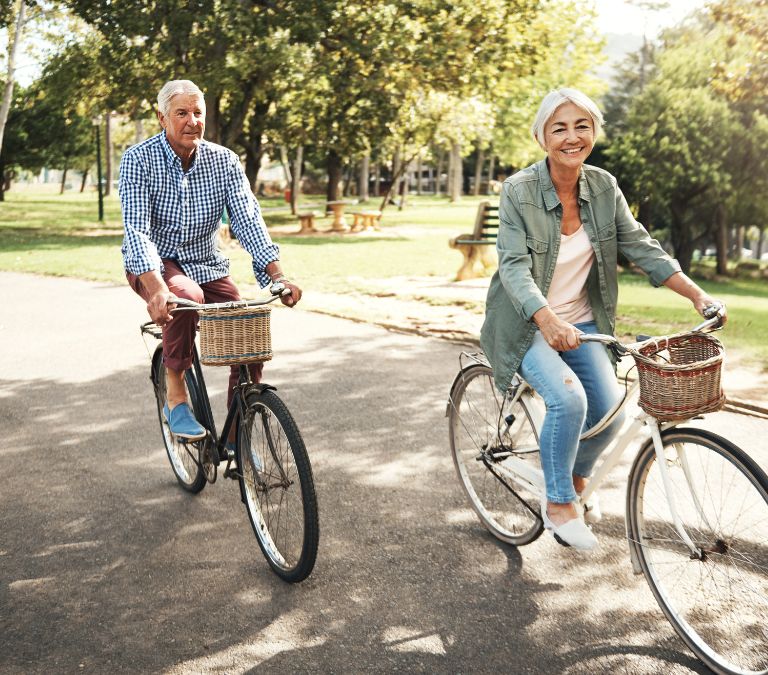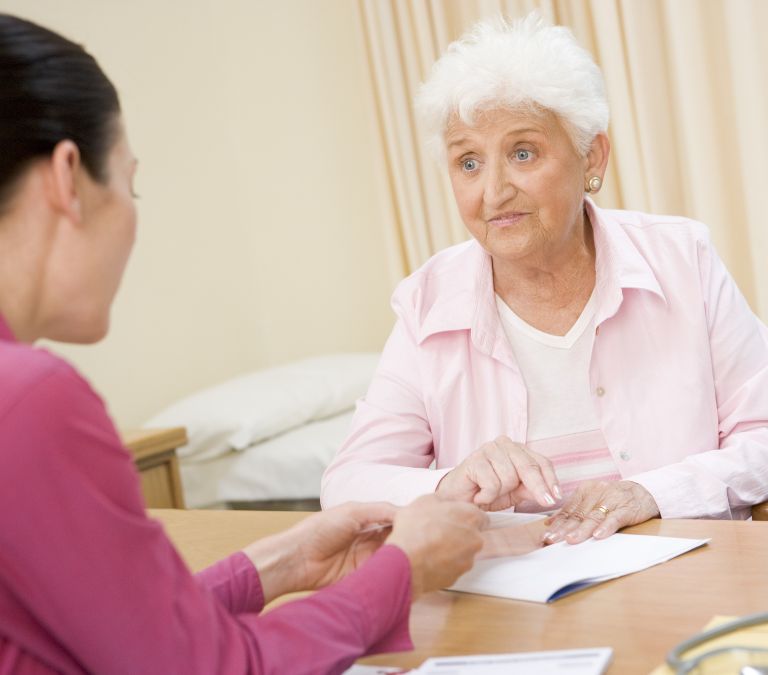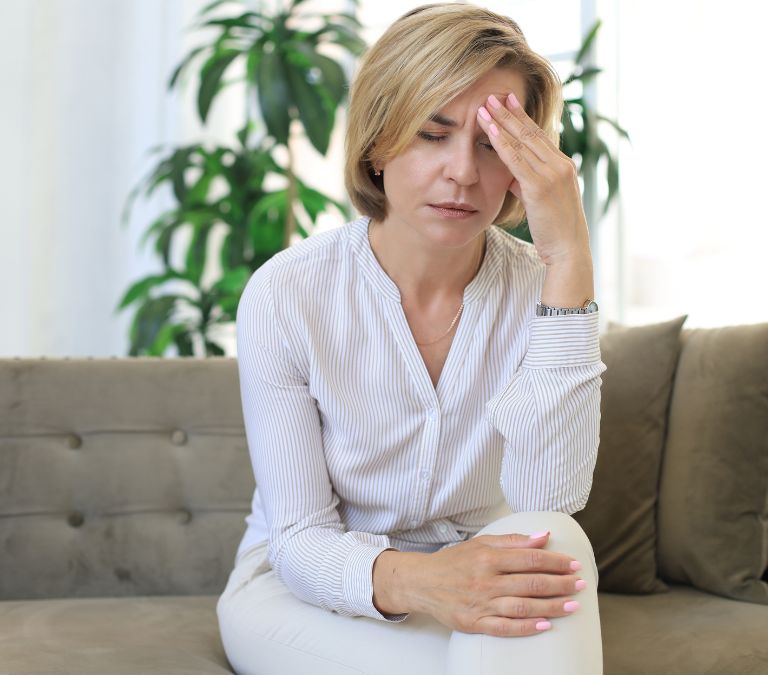For many women worldwide, the menopausal transition can be terrifying and turbulent. As periods slowly stop and hormonal fluctuation steps in, you become more vulnerable to symptoms like hot flashes, night sweats, vaginal dryness, and distorted sleep. The hormone drop also increases your risk of developing severe diseases like osteoporosis, cardiovascular diseases, memory loss, bloating, eye dryness, and certain cancers.
Due to the symptoms related to menopause, the standard of living of many menopausal women is heavily depreciated. Menopause affects your physical and mental health. For the former, treatment and management options could be very effective. However, the latter says otherwise.
Women are the most affected by mental health issues in the United States. Today, more women are suffering from problems like anxiety, panic attacks, depression, irritability, and dementia. The ratio of women suffering from mental health issues to men with mental issues is 2:1.
In every ten people with a mental health issue, at least 7 are bound to be women. Of these women, menopausal women constitute a high percentage. Fluctuations in hormonal levels during menopause can alter the metabolism of chemicals in the brain, which makes mood swings, anxiety, and depression imminent.
Causes of Anxiety and Depression during Menopause

Two key hormones affected by menopause are estrogen and progesterone. Since these hormones are mainly produced in the ovaries, they may rapidly decline during menopause. When these hormones decline, the body experiences several symptoms which cause both physical and mental pain. Menopause affects women’s mental health in two ways; directly and indirectly.
For the direct method, the fluctuations in hormones can directly cause changes in the operations of neurotransmitters in the brain, leading to symptoms like irritability and mood swings. In most cases, menopause doesn’t directly harm the brain.
Sometimes, the symptoms become overwhelming and may cause changes in a woman’s outlook on life. For example, menopausal symptoms like hot flashes could distort sleep patterns, leading to weight gain and cardiovascular diseases. These symptoms could be detrimental to the lifestyle of menopausal women, which could cause severe mental issues like depression.
Treatments for Menopausal Anxiety
Treatment options for treating menopausal anxiety differ from options for treating physical symptoms. Hormone therapy has become the most common and effective treatment option for common menopausal symptoms like hot flashes, night sweats, osteoporosis, and vaginal dryness. However, hormone therapy and other common medications today haven’t been effective enough to get optimal satisfaction from treating mental issues caused by menopause.
Due to the ineffectiveness and risks associated with hormone therapy, many doctors and other medical practitioners have advised menopausal women to take natural remedies as their first options for problems like depression and anxiety during menopause.
Natural Remedies for Treating Menopausal Anxiety
Different women react differently to menopause. While many women have shown positive improvements in their general mood by adopting natural remedies, others have shown not-so-great results. Due to the variation in the body’s reaction to natural treatment methods, menopausal women are advised to hear from a doctor before trying it out.
The concept of natural remedies is quite simple; trying out options that do not involve artificial treatments like hormone therapy, supplements, sedatives, antidepressants, and other medications made in the lab.
While every organ in the body ensures optimal survival, the brain is considered the most important and complex. Due to the delicacy of the brain, all issues related to it are handled with utmost care and precaution. With more medications and related therapies for menopausal anxiety springing up every day, studies on their effects on the brain and other vital organs of the body have been quite limited.
A recent study observed that anti-anxiety medications, even with their ineffectiveness, could cause problems as severe as respiratory suppression and, in some cases, dementia and other forms of cognitive impairments. While many of these medications can be effective sometimes, the risks can in no way be overlooked. Natural remedies come into the picture here.
Menopausal Anxiety: 10 Natural Remedies
Compared to medications, natural remedies for menopausal anxiety take longer and often require consistency. It means menopausal women going for natural remedies ought to be patient and stick to the process for as long as it takes. The results are mind-blowing!
Here are the top ten most effective natural remedies for menopausal anxiety:
- Herbal Supplementation
With more complementary therapies being studied for menopausal symptoms, several herbal supplements have shown characteristics capable of helping women with the lingering problem of anxiety and depression caused by menopause. Some of the most effective herbal supplements for menopausal anxiety and depression include:
- Ginseng
For many years, people have used ginseng as a treatment option for relieving stress and improving mental health. If depression and frequent anxiety are left untreated for a long time, physical problems like panic attacks may emerge, and if treatment is still not given, patients may end up being exposed to intense physical harm like suicide. Stress is a major cause of depression in menopausal women, and ginseng has been proven to help relieve stress.
Studies have shown that ginseng is effective enough to protect the nervous system and prevent memory loss, a common symptom of menopause. By helping to protect the brain and relieve stress, ginseng can help relieve the feeling of depression, especially during menopause. Menopausal women suffering from anxiety and depression are advised to get ginseng supplements to help them suppress stress and, in turn, prevent or treat depression and anxiety.
- Lavender
Also referred to as the calming herb, lavender has recently been observed to be effective enough to help manage symptoms of anxiety and depression. Lavender is commonly used to make soaps and perfumes. However, recent studies have shown that this calming herb could effectively manage problems like anxiety, agitation, nervousness, depression, disturbed sleep, and restlessness.
Today, the aroma of lavender is known to calm individuals without sedating them. Lavender has also been shown to affect the nervous system by regulating bodily processes like breathing rhythm and heart rate to restore neutral and balanced states during anxiety, depression, and other psychological problems. Lavender has become an important herb for the mental health of menopausal women due to its ability to promote good and healthy sleep.
- John’s Wort
Also known as Hypericum perforatum, St. John’s wort is one of the highest-selling supplements in the US. Studies have linked this supplement as an effective helper for sleep problems, anxiety, and depression. St. John’s wort is believed to be an effective antidepressant as it prevents the brain from overusing neurotransmitters. By regulating the use of neurotransmitters by the brain, feelings of anxiety are suppressed.
An analysis carried out in 2017 observed that St. John’s wort was as effective as many antidepressants and could be very effective for treating varying severity of depression. Before taking St. John’s wort supplements, menopausal women are advised to see a doctor first because while it has been very effective in dealing with anxiety in many menopausal women, it has aggravated anxiety in other women.
- Chamomile
An exploration study observed that chamomile possessed certain antidepressant features that could be very useful for menopausal women with problems of anxiety and depression. Besides its role as an alternative treatment for menstrual disorders and inflammation, chamomile can be effective in helping to uplift mood and promote relaxation.
Studies have shown that chamomile can stimulate or trigger the release of dopamine and serotonin, hormones known to have calming effects on the brain. Chamomile supplements can be very useful in helping menopausal women eradicate anxiety and depression.
- Ashwagandha
Ashwagandha is a popular herb in India used to facilitate healing for many diseases. This herb is popular as a treatment option for anxiety. While studying the components of ashwagandha, herbs contain compounds with anti-stress properties. In a research conducted in 2014, researchers were able to test the effectiveness of ashwagandha on five humans. In their research, four volunteers experienced decreased anxiety levels after taking ashwagandha.
- Embracing Relaxation Techniques for Healthy Sleep
Relaxation is considered a form of therapy for people suffering from anxiety issues. Studies have shown that relaxation is one of the most effective therapies for cushioning psychological issues like anxiety and depression during menopause.
One of the symptoms of menopause is the inability to get enough sleep; unfortunately, most menopausal women in the United States suffer from it. In many cases, painful hot flashes and discomforting night sweats are the main issues affecting the sleep patterns of menopausal women today. While sleep distortion may sound like a small problem, many people today have gotten sick from insufficient sleep.
According to research, sleep deprivation can affect general mood and worsen cases of anxiety and depression in menopausal women. To deal with the problem of anxiety and depression during menopause, doctors and other medical practitioners have suggested relaxing and getting healthy sleep as likely solutions.
Menopausal women finding it hard to get enough sleep are advised to visit the doctor and not self-medicate with sleeping pills. In several cases, menopausal women work long hours and never find the time to relax. Menopausal women suffering from anxiety and depression are advised to find things that make them relax.
From binge-watching romcoms to going on late-night walks and even reading books, options for relaxation techniques are endless and quite effective in getting good sleep and helping to alleviate psychological issues, especially during menopause.
During menopause, it becomes extra difficult to get enough healthy sleep. Menopausal women have often complained of difficulty getting to sleep, difficulty staying asleep, reduced daily sleep time, tiredness, and early morning wakening. Here are some proven ways to get longer and healthier sleep:
- Pick a fixed time to go to bed and wake up. Having a fixed sleep time could be crucial in establishing a regular sleep pattern.
- Try to stay awake during the day. If you stay busy during the day, you tend to make your body hungry for sleep. If you must sleep during the day, keep it for less than 40 minutes. By doing this, you may be assured of long sleep hours at night.
- Eat dinner three hours before sleeping. If you exercise before bed, ensure you do that subtly and at least 2 hours before bed. Also, it is advised to eat light meals for dinner. Do not go to bed if you’re too full or if you’re too heavy.
- Avoid watching TV while in bed. When it is time to sleep, put your computers with display screens aside.
- Do not drink coffee or alcohol at late night hours. Your last coffee, caffeinated products, or alcohol intake should be during the late afternoon hours.
- Try to make your bedroom cool, not cold, and get as comfortable as possible.
- If you wake up in the middle of the night and can’t get back to sleep, try doing something boring and quiet. If you feel sleepy again, then go to bed immediately.
- Cutting Caffeine and Alcohol Intake
The foods consumed by menopausal women can either aggravate or alleviate symptoms. In the case of anxiety and depression, coffee, caffeinated products, tobacco, and its products, and alcohol, are aggravators. Menopausal women who take in high amounts of coffee and alcohol are three times more likely to develop h mood and mental heal problems.
In many cases, menopausal women suffering from anxiety and depression may turn to alcohol to make them feel better. While many women tend to feel more relaxed and calm after downing a bottle, studies have shown that more severe cases of depression, mood swings, anxiety, and irritability will come knocking in the long run.
Studies have also shown that excessive alcohol and caffeine intake could increase the severity of other symptoms like hot flashes and night sweats. Generally, women in menopause shouldn’t just reduce alcohol intake to help reduce anxiety; they should do it to live healthy lives and reduce the complications caused by fluctuating hormones during menopause.
- Exercises and Physical Activities

Besides helping reduce the risk of individuals having too many health problems, exercises also show positive results as a treatment option for anxiety, depression, and general mood. Today, menopausal women who engage in exercises and other physical activities are less likely to show severe menopausal symptoms and also have less risk of developing problems like cardiovascular diseases and certain cancers. Regarding psychological problems, exercises and other forms of physical activities have been proven to help brighten mood, preventing depression and anxiety from worsening.
While exercising, the body secretes endorphins capable of making a person feel good, gain confidence, and get happier. For anxiety and other psychological issues, menopausal women are encouraged to engage in more exercises to alleviate them. Society has made life too comfortable that many people no longer see the need to visit the gym or even use the bike in place of the car.
Today, there are elevators, escalators, dishwashers, and even self-driving cars. These machines have proven that humans do not need all the strength in the world to live a nice and happy life. However, many people no longer take gym lessons seriously, and it has greatly affected the health of these people, especially women in their mid-ages (menopausal women).
Exercises will improve mood and general health, and menopausal women are advised not to be very intentional about exercising to attain optimal health. Exercises like cycling, swimming, running, and yoga have frequently been proven to help relieve psychological problems, especially during menopause.
- More Vegetables Lead to Healthier Diets Options
Healthy foods have been shown as likely alleviators of anxiety and depression. Vegetables and fruits take center stage when we talk of healthy foods. Modern society has successfully made many people see processed foods as the most accessible and best foods in stores. However, greens are. Many greens, like Swiss chard, spinach, kale, okra, and potatoes, have a high content of magnesium, a mineral that may help ease anxiety during menopause.
Menopausal women are advised to eat more whole foods, greens, legumes, fish, and whole grains to help with anxiety and depression. Studies have shown that menopausal women who consume more processed foods are likely to experience more severe anxiety, mood swings, depression, and even panic attacks. To deal with menopausal anxiety and to live a healthier life with few complications, menopausal women are advised to eat healthily by taking in more vegetables and less processed foods.
- Aromatherapy
Aromatherapy is a healing treatment that utilizes the soothing aroma of herbs and essential oils to help meditate and improve the health of the body. In most cases, natural oils are inhaled directly. In other cases, the essential oils are added to warm baths.
Aromatherapy is believed to help people sleep better, think better, balance blood pressure, and help relax better. Common essential oils used in aromatherapy include grapefruit, lavender, and bergamot. These essential oils are believed to help relieve anxiety and also brighten the mood.
- Acupuncture and Massage Therapy
Alternative therapies like acupuncture and massage therapy can be very relaxing and, as such, can alleviate anxiety and depression. Some research has supported using acupuncture and massage therapy as treatment options for mental health conditions. Acupuncture and massage therapy can help relieve stress and boost feelings of well-being. For some women, alternative therapies like these will go a long way in helping them alleviate conditions like menopausal anxiety.
- Deep Breathing
A characteristic attitude portrayed by people with anxiety is fast and shallow breathing. Short breaths lead to a fast heart rate, which can give room for severe cases of anxiety, dizziness, and even panic attacks. As a remedy, menopausal women with anxiety problems can practice deep breathing.
Deep breathing exercises are intentional actions to ensure slow and deep breaths to reduce anxiety and restore normal breathing patterns. Studies have shown that people who practice deep breathing are less likely to develop high blood pressure and anxiety.
- Getting Support
In many cases of anxiety and depression during menopause, all the woman needs is support, not medications, not sleep, not even diet options. Anxiety and depression are not handled individually. For this reason, menopausal women going through psychological symptoms are advised to share their conditions with family and close friends.
A strong support system is very important for dealing with depression. Women who feel they lack support can find strong support systems in religious centers, clubs and societies, and therapists. Regardless of background and social status, depression is better managed when shared.
- Positive Attitude
With all the problems and complications during menopause, many women find it difficult to develop and maintain a positive attitude. As difficult and tasking as maintaining an optimistic attitude during menopause may seem, it is important to know that it is a fundamental pillar in the path to recovery. Generally, menopausal women with anxiety and depression can find something they enjoy doing. It could be watching a favorite show or being intentional about getting better. Having a positive attitude will go a long way in facilitating fast recovery.
When to See a Doctor

Conditions like anxiety and depression are delicate and often require delicate management. Menopausal women who suddenly experience short and quick breaths are advised to see the doctor immediately. Also, take cases of frequent nightmares, panic attacks, and severe moodiness to the doctor. Generally, menopausal women showing menopausal symptoms are advised to see a doctor to help them get the best treatment and management options for their symptoms.
Conclusion
Physical symptoms of menopause are given more prominence in today’s society. However, mental symptoms can be detrimental to women. With fewer treatment options for mental symptoms of menopause, many women today do not even know the next step to take when feeling like anxiety, moodiness, irritability, and depression become amplified. Visiting a doctor can be a major step in getting the right answers. You are not your illness.







